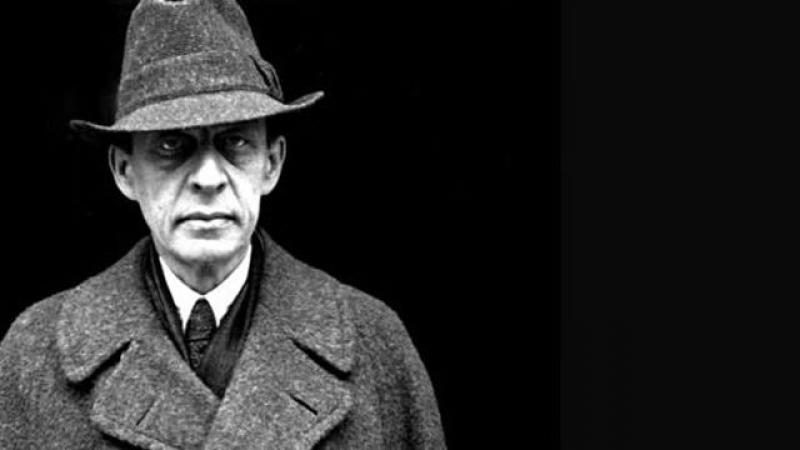


Rachmaninov’s choral symphony The Bells always feels like a valedictory late work, a composer’s eloquent, melancholy adieu both to pre-revolutionary Russia and to the fulsome late-romantic style which had served him so well. Happily, Rachmaninov’s career didn’t finish in 1913, and his last few decades in exile resulted, sporadically, in some stunning pieces – the Paganini Rhapsody and the Symphonic Dances among them.
I’d not previously realised the extent to which Edgar Allan Poe’s original poem had been reshaped in Konstantin Balmont’s translation. Poe’s first section concludes with the lines ”All the heavens seem to twinkle/ With a crystalline delight.” Balmont’s version finishes on a more downbeat note, with “the little bells ring out… together with the singing, they tell of oblivion.” Poe’s subsequent paean to the joys of marriage becomes a far more brooding affair, ideally suited to Rachmaninov's temperament.
Rachmaninov’s nightmarish third movement scherzo was appropriately disconcerting
This was a Bells performance [3] which contained many choice ingredients – a BBC Philharmonic sounding reinvigorated after several tepid moments in the concert's first half, and consistently peerless singing from the Leeds Festival Chorus’s sopranos and altos. The problematic Leeds Town Hall acoustic fought against them, with Rachmaninov’s overblown tuttis frequently sounding muddled and congested despite Simon Wright’s incisive, clear direction. I’m now convinced that the best seats are in the stalls near the front, where the orchestral sound hasn’t got the space to dissipate.
Maybe one problem is that this work seems designed to suit the abilities of a gargantuan Slavonic choir. Listen to Kiril Kondrashin’s elderly Moscow recording and you’re poleaxed by the ferocity, the heft of the singing. You couldn't help feeling that there just weren't enough performers. Things seemed a little too polite – intonation was impressive, but the volume was rarely sufficiently extreme. Socks weren’t blown off. Tenor Daniil Shtoda sounded distinctly uncomfortable during his long, exposed entry, but recovered as the movement progressed, and the movement’s haunting central section, all twinkling celeste and choral humming, was exquisite.
Hearing tubular bells gently intone the Dies Irae near the end of the second poem was spine-tingling. Soprano Sarah Tynan [4]’s extended solo was suitably underplayed. Rachmaninov’s nightmarish third movement scherzo was appropriately disconcerting. At last the mens' voices coarsened in the right way, despite the hall’s acoustic making their contribution hard to decipher. Wright’s last movement really delivered, with an eloquent baritone solo from Mark Stone [5] paving the way for a heart-stopping, redemptive coda. A string melody derived from the opening cor anglais lament suddenly soars and ebbs away into silence. Described as such, it sounds irredeemably cheesy; in Rachmaninov’s canny hands the effect is sublime. The audience applause seemed oddly muted – until you realise that full-throated adulation is inappropriate for such an emotionally devastating ending.
The Bells was prefaced by a selection of movements taken from the same composer’s All Night Vigil (commonly, if innacurately, referred to as the Vespers). You missed the resonant rasp of Russian basses, but the acapella forces were shrewdly led, their lack of vibrato allowing Rachmaninov’s squelchy chord progressions to register with clarity. The concert started with a sweetly sung rarity – Schumann’s crepuscular Nachtlied, a brief, restrained setting of a romantic poem by Friedrich Hebbel. Rarely rising above mezzo forte, it fades away to the sound of plucked strings and a lonely solo clarinet.
This being a Saturday night concert outside London, we also got Bruch’s G minor Violin Concerto. Flame-haired soloist Rachel Kolly d’Alba was an engaging presence, investing a potentially hackneyed work with genuine emotional depth. If only she could have played instead a concerto by Bartok, Prokofiev or Shostakovich. A pity too that the players of the BBC Philharmonic took so long to warm up , though their big Straussian melody in the slow movement sounded magnificent.
Links
[1] https://theartsdesk.com/users/grahamrickson
[2] https://www.addtoany.com/share_save
[3] http://www.theartsdesk.com/classical-music/london-philharmonic-orchestra-jurowski-royal-festival-hall-3
[4] http://www.theartsdesk.com/opera/don-giovanni-english-national-opera-0
[5] http://www.theartsdesk.com/opera/eugene-onegin-holland-park-opera
[6] http://www.amazon.co.uk/s/ref=nb_sb_ss_i_0_14
[7] https://theartsdesk.com/node/550/view
[8] https://theartsdesk.com/node/26806/view
[9] https://theartsdesk.com/node/50887/view
[10] https://theartsdesk.com/node/2445/view
[11] https://theartsdesk.com/classical-music
[12] https://theartsdesk.com/topics/rachmaninov
[13] https://theartsdesk.com/topics/leeds